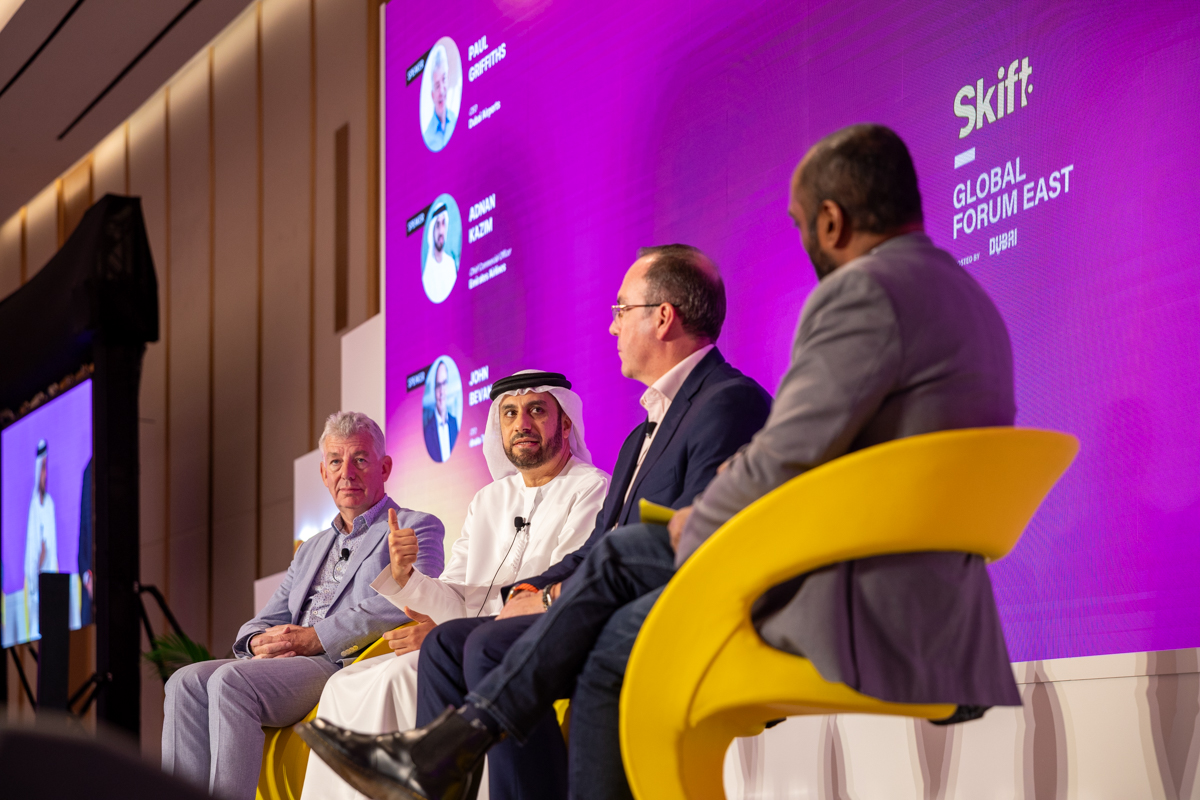Skift Take
Dubai's rapid growth presents the challenge of balancing the pitfalls of mass travel against a sustainable and satisfying travel experience.
In the dynamic world of air travel, sustainable growth and adapting to shifting demographics stand as both opportunities and challenges.
Dubai’s approach to these growing global concerns was unpacked as a case study for the future of air travel at the Skift Global Forum East Thursday.
By integrating various transport modes – autonomous cars, trains, and planes – at different stages of a journey, destinations can pioneer a multi-modal transport strategy, according to Paul Griffiths, CEO of Dubai Airports.
By integrating various transport modes – autonomous cars, trains, and planes – at different stages of a journey, destinations can pioneer a multi-modal transport strategy, according to Paul Griffiths, CEO of Dubai Airports.
Griffiths shared a “eureka moment” he experienced on his way to speak at a conference. His short flight delayed was delayed and he decided to drive his car instead. But even though he had a return ticket, he was stuck and had to drive back. This frustration sparked his curiosity about alternative options for short-haul travel.
“Fifty percent of the world’s aviation is on sectors of lower than 500 miles. If we could replace a good proportion of that with the idea of having autonomous vehicles as part of a network being able to accommodate us on those overnight journeys for long distances, what then happens [is] the misery of mass transportation starts to disappear,” said Griffiths.
Multi-Layer Industry Cooperation
Griffiths, Adnan Kazim, chief commercial officer of Emirates Airline, and John Bevan, CEO of dnata Travel Group, discussed how Dubai is innovating to grow its tourism offering. The debate, spearheaded by Skift Advisory’s Oliver Martin, looked at Dubai’s growing appeal and ways its “blank canvas” could benefit consumers, the region, and the planet.
A multi-modal approach fits in with rising sustainability aspirations in multi-destination long-haul travel.
Travelers should be able to seamlessly visit Dubai, Ras Al Khaimah, Saudi Arabia, or any regional destinations in one trip. The result should be a more enriching and meaningful long-haul experience. And potentially a sustainable one at that.
Emirates’ Kazim argued that the Gulf carrier’s fleet expansion highlights its commitment to sustainability. Kazim said the airline is set to introduce 350 new aircraft by 2030 and that these wide-body aircraft showcase Emirates’ commitment to large-scale, long-haul operations.
He discussed the Gulf carrier’s Sustainable Aviation Fuel Road Map, having tested SAF on its flights to Sydney. The airline has also secured a SAF supply of 3 million kilograms for 2024-2025.
Kazim, however, stated the aviation sector needed a wholesale change involving government, supply chain, and manufacturers like Boeing and Airbus to transition from fossil fuels to sustainable alternatives.
“The quantity that needs to come in a commercially viable sort of size so that airlines can be using it in the future, that’s not there yet,” said Kazim. “I think there is a lot of change that needs to come in terms of moving from fossil fuel… That needs a lot of investment coming from various stakeholders and putting money behind it to make it available in terms of quantity… You need the oil companies to be part of this ecosystem. We need airports to be engaged as part of that change as well. It’s like a multi-layer.”
Universal Sustainability Standard
However, the discussion underscored the fact that the travel sector lacks a universal standard for sustainability akin to the hospitality industry’s still-imperfect star rating system. It requires collaborative efforts from various stakeholders to achieve meaningful and measurable environmental progress.
“There’s no common standard, unlike the star rating, which we know is not perfect around the world, but at least gives you an indication [of expected quality],” said dnata Travel Group’s Bevan. “At the moment, there are multiple bodies assessing sustainability for hotels, for example. So we are working on trying to take the best ones or the biggest ones and then do a common platform.. for our consumers to choose. My job really isn’t to tell people to go sustainable. My job really is to offer them the best choice, and those who are willing to pay the difference, too often that is more expensive, then they can do so.”
Dubai Airport’s Griffiths further emphasized there is a lack of harmony among government regulators, consumer behavior, and industry innovation efforts, saying, “I think that the change in behavior has to be on both sides… And the difficulty, I think, is that at the moment, it is seen as an option.”
“You can tick the box to add another few dollars to your flight to make it sustainable. I wonder if we need it the other way around,” said Griffiths.
Dubai’s Future Mega Airport
Emirates Airlines currently serves 130 destinations, but this would dramatically increase with the future D33 vision for Dubai, aiming to connect with 400 cities, said Kazim.
“It opens new opportunities and brings a new population to Dubai that today maybe Dubai doesn’t have,” said Kazim.
It also creates the added need for infrastructure investment, including a future mega airport. Dubai Airport projects 85 million passengers in 2023, nearing its 2019 record, with immediate expansion through technology expected to handle 20-30 million more passengers.
“What we’ve got to do is take the bold step of creating this mega airport but to me the tricky bit is how do we make something of that scale, actually beautiful and I think the idea of bringing that intimacy to travel again, it’s got to be the way forward,” said Griffiths.
The Daily Newsletter
Our daily coverage of the global travel industry. Written by editors and analysts from across Skift’s brands.
Have a confidential tip for Skift? Get in touch
Tags: aviation industry, dnata, dubai, Emirates Airline, sgfe2023, sustainability, sustainable aviation fuel
Photo credit: Paul Griffiths, CEO, Dubai Airports, Adnan Kazim, CCO, Emirates Airline, John Bevan, CEO, dnata Travel Group in discussion with Skift Advisory's Oliver Martin. Skift
